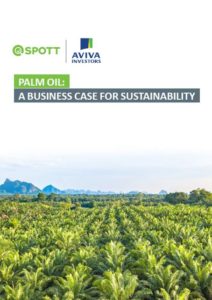To date, arguments used to persuade the palm oil industry to improve its practices have focused, quite rightly, on the ecological and moral cases for change. However, these arguments have not yet been enough to convince all actors in the industry to improve to the extent required to ensure sustainable palm oil production.
Operational, reputational or regulatory risks in the palm oil sector may translate in financial terms. The study commissioned by ZSL found that on average, companies scoring higher on SPOTT outperformed lower-scoring companies on a total return basis by around 20%, when comparing the top- and bottom-scoring halves of the dataset from 2014-19 (Fig. 2 in the report). The highest-scoring companies also appeared to show lower levels of volatility and more consistent returns (Fig. 3 in the report).[1]
Eleanor Spencer, Engagement and Impacts Coordinator at ZSL, said: “Our research shows that SPOTT-assessed palm oil companies with stronger disclosure on the sustainability of their operations clearly outperformed those with weaker sustainability disclosure, over a five-year period. This new data is substantiated by extensive existing evidence of the risks of unsustainable palm oil production to a company’s bottom line.”
“Improving both the transparency of reporting and the sustainability of actions on the ground is vital for a company to earn a better reputation and achieve long-term profitability.”
The destruction and degradation of tropical forests for oil palm cultivation has serious negative impacts on both wildlife and people, contributing significantly to the climate crisis. As global forest loss is at an all-time high, long-term investors see a clear case for addressing these issues and engaging companies in palm oil supply chains.
Eugenie Mathieu, Senior SRI Analyst at Aviva Investors, said: “There is no greater collective risk we face today than climate breakdown. To reduce the palm oil sector’s contribution to this crisis, its impacts on the world’s forests must be addressed with urgency. To do so, Aviva engages with investee palm oil companies to push for best practice implementation.”
This report, written by ZSL in conjunction with Aviva Investors, makes a clear argument for companies to urgently change their practices and for the whole sector to push for sustainability. It is aimed at producers, buyers and investors seeking to understand the financial and business-based arguments for addressing the environmental, social and governance (ESG) impacts of unsustainable palm oil production.
[1] Find a summary of the methodology used and limitations of the analysis (page 6 and page 9 of the report, respectively).

